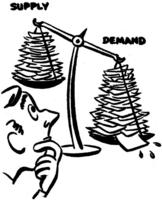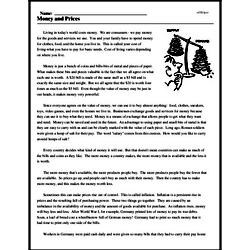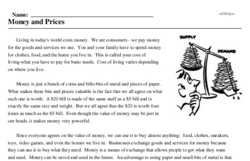Money and Prices
Living in today's world costs money. We are consumers - we pay money for the goods and services we use. You and your family have to spend money for clothes, food, and the home you live in. This is called your cost of living-what you have to pay for basic needs. Cost of living varies depending on where you live.
Money is just a bunch of coins and bills-bits of metal and pieces of paper. What makes these bits and pieces valuable is the fact that we all agree on what each one is worth. A $20 bill is made of the same stuff as a $5 bill and is exactly the same size and weight. But we all agree that the $20 is worth four times as much as the $5 bill. Even though the value of money may be just in our heads, it makes money very powerful.
Since everyone agrees on the value of money, we can use it to buy almost anything: food, clothes, sneakers, toys, video games, and even the homes we live in. Businesses exchange goods and services for money because they can use it to buy what they need. Money is a means of exchange that allows people to get what they want and need. Money can be saved and used in the future. An advantage to using paper and small bits of metal is that they are easy to carry with us and can be clearly marked with the value of each piece. Long ago, Roman soldiers were given a lump of salt for their pay. The word "salary" comes from this custom. How would you like to carry around lumps of salt?
Every country decides what kind of money it will use. But that doesn't mean countries can make as much of the bills and coins as they like. The more money a country makes, the more money that is available and the less it is worth.
The more money that's available, the more products people buy. The more products people buy the fewer that are available. So prices go up, and people can't buy as much with their money. Then the country has to make more money, and this makes the money worth less.




